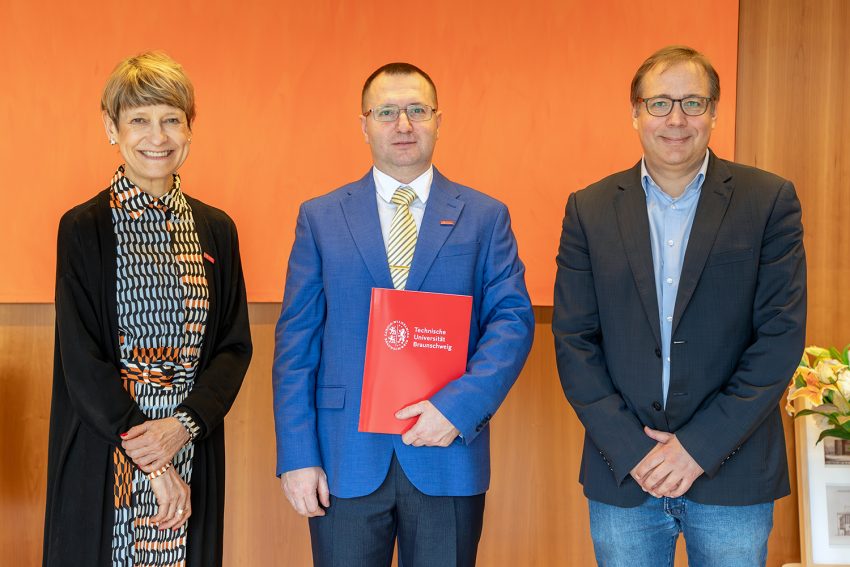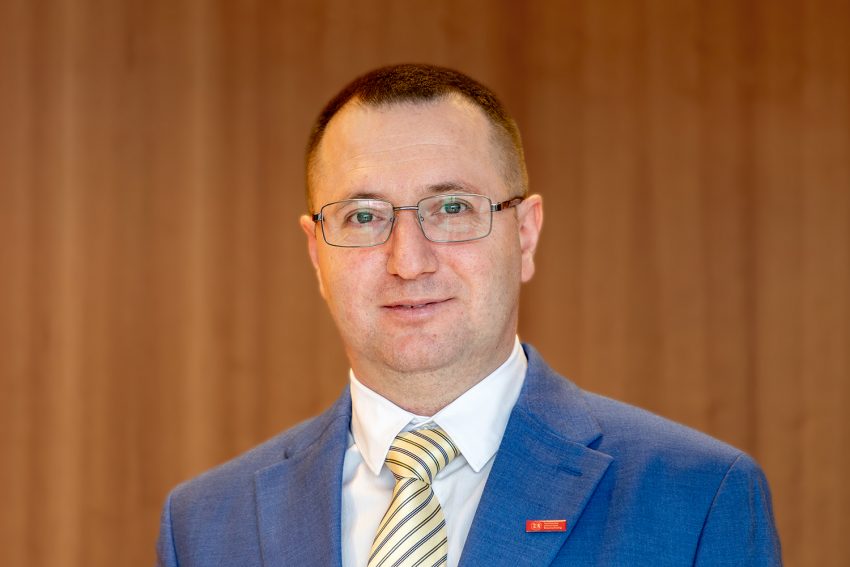Of fluxons and magnons Prof. Oleksandr Dobrovolskiy of the Institute of Electrical Measurement and Fundamentals of Electrical Engineering
Oleksandr Dobrovolskiy has been a professor at Technische Universität Braunschweig since July 2024. He heads the Department of Cryogenic Quantum Electronics at the Institute of Electrical Measurement and Fundamentals of Electrical Engineering. He is interested in superconductivity and magnetism and the quantum devices based on them in sensor and measurement technology. In his answers to our questionnaire, he explains what he likes about Braunschweig and why he has specialised in quantum electronics.
Why did you choose TU Braunschweig?
Braunschweig offers an excellent research environment for my activities in the field of cryogenic quantum electronics. With its research focus on metrology, its networking with the PTB (Physikalisch-Technische Bundesanstalt), the modern infrastructure of LENA (Laboratory for Emerging Nanometrology) and the unique combination of the focal points of the Faculty of Electrical Engineering, Information Technology and Physics, TU Braunschweig is in an outstanding position.
What exactly do you do in your research? How would you explain your work to a non-specialist?
My scientific expertise is mainly in the dynamics of flux quanta (fluxons or vortices) in superconductors and spin waves (and their quanta – magnons), the collective excitations of the spin system of a magnetic solid. These fields are part of superconductivity and magnetism, and thus of solid state physics, and also of sensing and measurement in electrical engineering. They also form the basis of cryogenic quantum electronics, where fluxon- and magnon-based electronics are called fluxonics and magnonics respectively.
Spin waves and vortices are considered as data carriers for novel data processing systems, since they have length scales (wavelength, lattice constant) in the nanometre range at frequencies up to the terahertz range, enable information transmission over macroscopic distances with very low Joule heating, and offer new platforms for metrology and wave-based computing concepts. In the medium term, we can also expect an expansion of magnonics and fluxonics into hybrid quantum technologies and their combination with semiconductor and photonic technologies.
By joining TU Braunschweig, I intend to pursue these highly interesting and challenging research directions, but also to break new ground. In addition, I am fundamentally interested in making my research even more application-oriented.

TU President Angela Ittel with Prof. Oleksandr Dobrovolskiy (m.) and Dean Prof. Dr. Patrik Recher. Photo credits: Kristina Rottig/TU Braunschweig
What research areas and projects will you be working on at TU Braunschweig?
Due to the TU’s research focus on “Metrology” and the close networking with PTB, a particular focus of my work will be the development of new systems for quantum electronics and quantum metrology. My intended contributions to the Cluster of Excellence EXC-2123 QuantumFrontiers offer the opportunity to embed these activities in both basic and applied research and to propose useful additions to the already represented research directions for subsequent large-scale projects. In my research, I have conceptualised several directions dedicated to the study of fluxon and magnon physics. Among the topics of my activities are non-equilibrium phenomena in electronic devices, curvature-induced effects in 3D nanoarchitectures, and fluxon- and magnon-based data processing.
What motivated you to do research in this area?
I did my PhD at the B. Verkin Institute of Low Temperature Physics and Engineering (ILTPE) in Kharkiv, Ukraine. The institute was one of the world’s leading research institutions in the field of low temperature physics and superconductivity, and it is also the institution where, for example, the AC Josephson effect was experimentally discovered in 1964 (by I. Yanson). Josephson effects are at the heart of metrology (so-called voltage standards) and are the basis for many research activities in Braunschweig. The development of electronic quantum devices in solid state systems is based on these effects.
Can you describe your daily work in three key words?
Teaching, research, administration.

